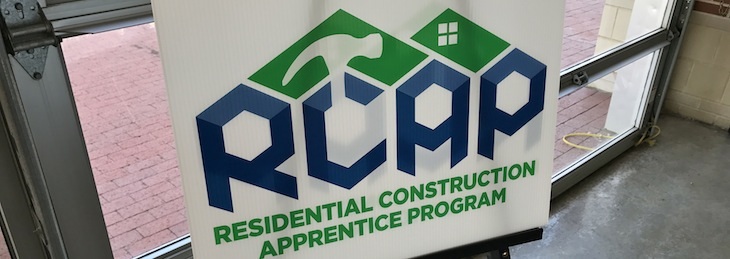Fort Smith Homebuilders group announces job training program with Fort Smith Public Schools
by February 9, 2017 7:35 pm 1,001 views

The Residential Construction Apprentice Program (RCAP) will launch this August from the Greater Fort Smith Association of Homebuilders (GFSAH) and Fort Smith Public Schools (FSPS).
According to GFSAH Executive Director Stephanie Stipins, the program has been accredited by the U.S. Department of Labor and the Arkansas Department of Workforce Education and will be taught by an Arkansas Department of Education-accredited instructor.
“The National Association of Homebuilders (NAHB) has a small group called HBI (Home Builders Institute). Our curriculum was set up through that particular company, but there are other associations across the U.S. that have similar programs. There is one in Spokane, Washington, that I used as a model along with HBI.”
Stipins told Talk Business & Politics Fort Smith Public Schools worked hand-in-hand with her in tailoring the program to Fort Smith students, but at present no one is sure what to expect participation-wise when the program starts later this fall.
“I get all kinds of things — five to ten, some have said I might get an entire classroom of 25. We don’t really know. We’ll know this year, and then maybe based off that, we will have a better idea for next year. What I’m hoping for is 15. That would be a good class size,” Stipins said.
According to HBI, the program will provide students skills and experience through pre-apprenticeship training, job placement services, mentoring, certification programs, textbooks and curricula.
“With an 80% job placement rate for graduates, HBI training programs are taught in local communities across the country to youth, veterans, displaced workers, and other underserved populations,” the website states.
Stipins added students will likely enter the program with a combination of class time and onsite general labor under the direct supervision of employers (i.e. members of the GFSAH). The employer will pay the student a to-be-determined hourly wage during the entirety of the course as incentive “with the hope they (students) will stay on after completion.”
“We want them to stay put and not shop around,” Stipins added, noting the rate of pay will be determined by looking at what builders are currently paying in the area and coming up with an “agreeable amount (to association members) that exceeds that.” So essentially, the cost of the program will be fully reimbursed should the student graduate. Stipins is also working to secure funding that would offer no-cost tuition, though funding agreements to do so are not yet in place. “That’s something I can’t confirm or deny at this point.”
RCAP tuition will be $500 plus the cost of books. The Fort Smith Adult Education Center will help administer the program.
Fort Smith builder and GFSAH Board President Rocky Walker highlighted the community’s need for RCAP.
“What’s kind of depressing is that last year we were last in the state for job creation among all the major metropolitan areas, and I would really like to change that this year. Something even more depressing is that most of the jobs being created are in Northwest Arkansas, and the rest of the state has to fight over a few crumbs. I don’t like that.”
Walker said the program is the association’s way of saying there is “another way.”
“Knowledge is great, but college is not for everyone, and there are ways that you can make money and have a career. You have to work hard in the construction field, but if you have a passion for it, you can make a good living and provide for your family, and we want to provide that opportunity whether you’re a young person or an older person looking to start over,” Walker said.
The 144-hour, 9-month course offered by GFSAH and FSPS will be open to high school graduates or GED-holders of all ages, and certification will transfer across state lines.
The Bureau of Labor Statistics (BLS) reported as of May 2015 there are approximately 427,500 jobs in residential building construction and extraction occupations nationally. Mean earnings of an employee in this subset are $20.80 per hour or $43,260 per year with entry level wages of $11.18 per hour and 90th percentile wages at $33.60.
An April 2015 study from the NAHB determined one-year impacts of building 100 single-family homes in a typical local area include $28.7 million in local income, $3.6 million in taxes and other revenues for local governments, and 394 local jobs with additional, annually recurring impacts of $4.1 million in local income, $1 million in taxes and other revenues for local governments, and 69 local jobs.
Likewise, one-year impacts of building 100 rental apartments produced an additional $11.7 million in local income, $2.2 million in taxes and other revenues for local governments, and 161 local jobs with additional, annually recurring impacts of $2.6 million in local income, $503,000 in local taxes and other revenues, and 44 local jobs.
